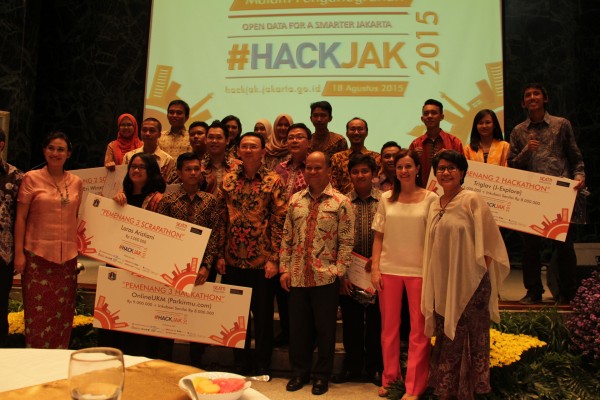This year, Making All Voices Count has been supporting the Jakarta City Government to convene the second annual HackJak - a combination of scrapathon, hackathon and visualthon that aims to make government data publicly available.
Working with civil society, the media and NGOs, the City Government has led an initiative to help them refine what their key governance ‘problem statements’ are, open government data to hackers, coders and graphic designers and see if, together, they can use this data find solutions.
How is HackJak breaking the mould?
Let’s start with the process. The collaboration with the Government of Jakarta resulted in the formulation of ‘problem statements’ prior to the competition. These were defined by several government agencies together with CSOs, Making All Voices Count and SEATTI.
Ria Ernunsari of Making All Voices Count explains:
We knew the issue was more open and responsive government. But formulating the problem statements took this to a different level.
The first step was to look at government data, what data is available? Then we collected input from universities and techies, what do they need to build a solution? Then we were able to define problem statements, based on available data and the needs of developers and designers.
A challenge for government and participants
For the Jakarta government #HackJak2015 is a great opportunity to prove that they are open for change and that they encourage citizen engagement. But, in trying to convince the world, they are publicly committing to provide transparent, up-to-date data - and sometimes that is a problem and requires investment in systems, processes and people.
Jakarta is a big city and often data is scattered or not available, that is a big challenge for the participants of HackJak. Jakarta government should make an effort to make all data available and up-to-date, but often Jakarta government doesn’t have the technical expertise. That is a problem.
Dr. Mussry, jury member HackJak
One of the HackJak participants also commented on the problems raised by lack of ICT expertise within government.
We had one week to build an app around one of the problem statements. In that week we were able to contact the government agency to learn more about the problem. That idea was really good. However, the man I spoke to did not have the technical knowledge to help me out.
A first step has been taken. Now it depends on the willingness of government to start using tech
Fahmi Islami, who works with the Jakarta government and is OGP ambassador for Indonesia, acknowledges that real transformation only happens when government is willing to use technology, and are willing to invest in training staff and using technology to improve their systems in the long term.
I think we have taken an important first step in changing the relationship between Jakarta citizens and government. Participants see that government is open to change by making their data available, and government has seen that participants can help them by building solutions based on these data. Now it is up to the government to start using these solutions. If they do, then we really achieved change.
The question for #HackJak2016 will be whether this change has really taken place.
About the author
Nicoline van der Torre is Communication Officer for Making All Voices CountRelated content
-
BLOG | October 26, 2015
#OGP15 - Is 'open government' really open? -
BLOG | October 30, 2015
OGP Summit ends with backslapping, but the real achievement was… -
BLOG | December 6, 2016
Open governance - the complexity of scale -
BLOG | February 21, 2014
Open government: Top-down needs bottom-up -
BLOG | December 5, 2016
Opening governance with a new generation in Liberia
